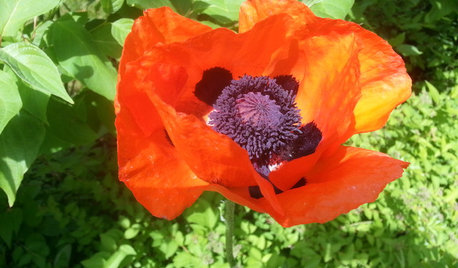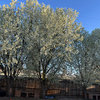roundup - too early?
carob
19 years ago
Featured Answer
Sort by:Oldest
Comments (49)
mowdy
19 years agolast modified: 9 years agoRosa
19 years agolast modified: 9 years agoRelated Discussions
Planting in Sacramento? How early is too early?
Comments (1)You probably could benefit from checking a hardiness zone map. Clink the link below and check out all the links on this site. Jan Here is a link that might be useful: hardiness zone map...See MoreHow early is too early to start seeds?
Comments (3)Hey, I'm in Cedar Rapids too! I would suggest direct sowing your squash, zucchini, and cucumbers. I transplanted some last year that I started and really, the direct sowed ones caught up with the transplants in no time - not worth the trouble of starting them indoors. I've no experience with melons so I can't help you there. Tomatos - I'd say mid-late March and you'll be okay - lanky plants really don't do that well. Broccoli can go out a bit earlier, I believe, so you could probably start that right now but I'm no expert as I've never grown it from seed. When in doubt, follow the directions on the seed packet! This my second year gardening here in IA and I can't wait! Good thing I'm having my third baby late-March/early April - gives me time to get into a routine before the gardening season really is in earnest!...See Moreearly bloom in growers pot - too early?!
Comments (11)According to the Takii PDF file the Canna Cannova Seed strain has taken over 10 years for development to meet the cooler and shorter growing climate of northern Europe. These cannas should fit well within large areas in the United States. Producing F1 hybrids such as this is expensive and time consuming undertakings. They more importantly offer the consumer virus free cultivars that are difficult to find available from most sources. One’s other option would to be purchasing tissue cultured and virus indexed plugs which are also more expensive and definitely not widely available. Therefore, depending on the source, the price may not be out of line for the product in my opinion. Here in the states, I did find a listing for some of the Cannove series available from Ball Seed Co. Given the time of the year and the fact that this is a new product, the availability may be limited or gone. Takii introduced the Tropical Series of canna several years ago and seed became readily available. Kent...See MoreHow early is too early to prune?
Comments (4)If the grasses are hardy for your zone, it makes no difference to cut them while the soil is frozen or to wait until it thaws. It is the activity of the grass and when it starts to grow that will determine the timing. And cutting back or not cutting back has no impact on whether the grass will increase in size (spread). Grasses growing wild have no one to cut them back and they will develop properly. Cutting back just improves the appearance in the garden and reduces self seeding on those so inclined. The Calamagrostis (Karl Foerster, Avalanche) are cool season grasses and will start growing soon so cutting back now before they are in active growth is advised. The flame grass is a warm season grass and won't start growing until temperatures warm up in mid to late spring so you can wait longer for those if you like....See Morecarob
19 years agolast modified: 9 years agoRosa
19 years agolast modified: 9 years agoBdadawg
19 years agolast modified: 9 years agocanyon_home
19 years agolast modified: 9 years agodelray
19 years agolast modified: 9 years agodavid52 Zone 6
19 years agolast modified: 9 years agoRosa
19 years agolast modified: 9 years agosunshinelovegirl
19 years agolast modified: 9 years agoRosa
19 years agolast modified: 9 years agocanyon_home
19 years agolast modified: 9 years agosunshinelovegirl
19 years agolast modified: 9 years agoRosa
19 years agolast modified: 9 years agodavid52 Zone 6
19 years agolast modified: 9 years agocanyon_home
19 years agolast modified: 9 years agosunshinelovegirl
19 years agolast modified: 9 years agoRosa
19 years agolast modified: 9 years agolilyroseviolet
19 years agolast modified: 9 years agoMichael_ut
19 years agolast modified: 9 years agoRosa
19 years agolast modified: 9 years agocanyon_home
19 years agolast modified: 9 years agoJAYK
19 years agolast modified: 9 years agoalthea_gw
19 years agolast modified: 9 years agoRosa
19 years agolast modified: 9 years agoalthea_gw
19 years agolast modified: 9 years agocanyon_home
19 years agolast modified: 9 years agoRosa
19 years agolast modified: 9 years agoalthea_gw
19 years agolast modified: 9 years agoRosa
19 years agolast modified: 9 years agoalthea_gw
19 years agolast modified: 9 years agodoccod
19 years agolast modified: 9 years agodavid52 Zone 6
19 years agolast modified: 9 years agolilyroseviolet
19 years agolast modified: 9 years agodelray
19 years agolast modified: 9 years agodavid52 Zone 6
19 years agolast modified: 9 years agoRosa
19 years agolast modified: 9 years agodavid52 Zone 6
19 years agolast modified: 9 years agoRosa
19 years agolast modified: 9 years agohenry_kuska
18 years agolast modified: 9 years agoemmettacres
18 years agolast modified: 9 years agoSheilaGail_NV
18 years agolast modified: 9 years agodustee1
13 years agolast modified: 9 years agojeremywildcat
13 years agolast modified: 9 years agodavid52 Zone 6
13 years agolast modified: 9 years agoetherealsunshine5
8 years agoZachS. z5 Platteville, Colorado
8 years agokeen101 (5b, Northern, Colorado)
8 years ago
Related Stories

RUSTIC STYLEHow to Outfit a Classic Farmhouse
You could research farmhouse decorating choices until the cows come home. Or you could just check out our hand-picked roundup here
Full Story
SMALL SPACES10 Tiny Kitchens Whose Usefulness You Won't Believe
Ingenious solutions from simple tricks to high design make this roundup of small kitchens an inspiring sight to see
Full Story
CITY GUIDESTravel Guide: Kyoto, Japan, for Design Lovers
Experience ancient traditions and modern expressions in this design-minded roundup of sights, hotels, shops and restaurants
Full Story
FURNITUREWindsor Chairs Join the Mod Squad
Think Windsor chairs are an Early American relic? These new takes put them squarely in the 21st century
Full Story
DECORATING GUIDESGift Guide: Gadgets Go Retro
20 gift-worthy add-ons give your smart phone or tablet the look of an arcade game, boombox, Etch-A-Sketch and more
Full Story
KIDS’ SPACESGuest Picks: Baby Blue Essentials
Light blue, white and neutral accents make for a relaxing and inviting nursery
Full Story
KITCHEN DESIGNKitchen of the Week: Quirky Texas Remodel
Playful Remodel Amps Up the Personality of 130-Year-Old Kitchen
Full Story
DECORATING GUIDESGadget Watch: What's New for the High-Tech Home
A heater fan, robotic vacuum, solar-powered iPhone charger and other hot home gadgets
Full Story
GARDENING GUIDESBeautiful Flowers and Foliage From Dedicated Backyard Gardeners
From lawn daisies to topiaries, Houzz users share their backyard beauties
Full Story
LIFEHard Winter? 9 Ways to Battle Cabin Fever
We know a lot of you are trapped where it just won’t stop snowing. Here are some ways to survive
Full StorySponsored
Columbus Area's Luxury Design Build Firm | 17x Best of Houzz Winner!




sunshinelovegirl